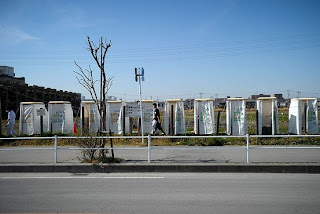By Kana Inagaki
Getty Images
Temporary toilets are seen as the water supply has been suspended due to the liquefaction triggered by the 9.0 magnitude earthquake in Urayasu, Chiba on March 19.Still wearing blue emergency overalls, Hideki Matsuzaki, the outspoken mayor of Urayasu, a seaside city near Tokyo, is still steering his community’s battle with the mammoth March 11 earthquake and ensuing damage.
More than a month after the disaster, residents in this town, the location of the Tokyo Disneyland theme park, are trying to come to grips with the vivid scars across the city, including warped roads, popped-up manholes and tilted houses caused by soil liquefaction.
Yomiuri Shimbun/Associated Press
- Soil liquefaction is seen in front of a police station in Urayasu on March 25.
What it was like when the earthquake struck on March 11? Was your home also damaged?
My house lost electricity, gas, water and plumbing – what I would call a quadruple whammy. My wife and daughter were out in Tokyo so they couldn’t immediately get back home. When I arrived at my house, all the dishes in the kitchen were destroyed so it took until past 3 a.m. to pick up the broken pieces. Then my wife finally came home.
What was the biggest challenge you faced?
I’d say it was the destruction of our lifelines caused by the bigger-than-expected liquefaction. We’ve done emergency repairs for now, but a full recovery of the sewage system will take more than three years. We’re like a primitive society not to be able to use the bathroom in this day and age. (As of Wednesday, nearly 300 households do not have functioning plumbing.)
Urayasu has long been known for soft grounds since it sits 75% on reclaimed land. Why did it take so long to restore water?
We knew our city was vulnerable to natural disasters. The name of our city, Urayasu (Ura means border between the waterfront and shore), is already telling. It’s a city that prays for the coastlines to remain tranquil. That is why we had put so much energy into disaster prevention measures.
The weak grounds and some extent of liquefaction were within our expectations. But our preparations were based on a magnitude-7.5 earthquake (not magnitude-9.0). We don’t know why a quake with an epicenter in northeastern Japan had wrought so much damage to our city. This is all completely unexpected.
How do you feel about the government’s response? Has this affected the long delays in restoring the lifelines?
Both the national and prefectural governments have dragged their feet. We have been hit with rolling blackouts three times despite the fact that our area was affected by the disaster. They don’t see or feel our pain, but I guess in that sense I had a free hand without having to be bullied (by the government).
Are you concerned that the popularity of the city will decline?
I think land prices will fall over the next one or two years. But our condominiums were undamaged despite such a widespread liquefaction. If you think about it, it’s actually a “buy.” And this doesn’t change the fact that we are close to central Tokyo. We’re going to do our utmost to restore our city and make it stronger.



Tidak ada komentar:
Posting Komentar